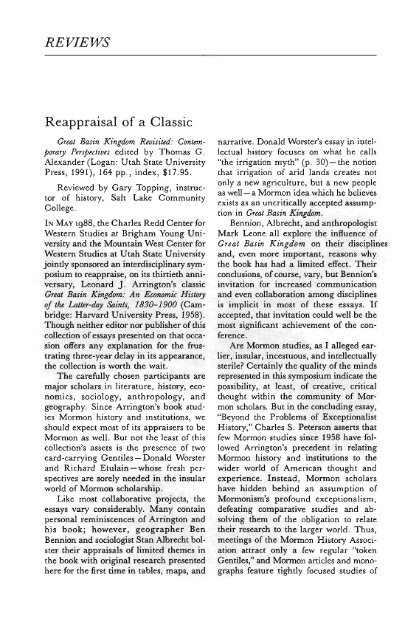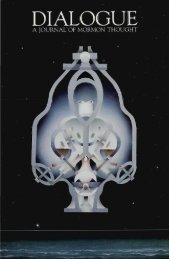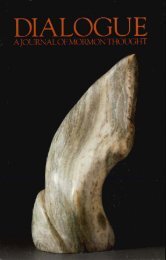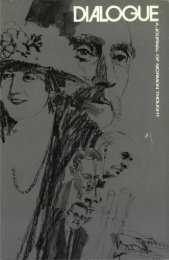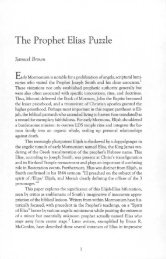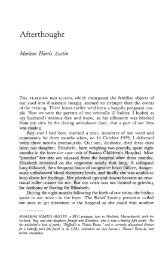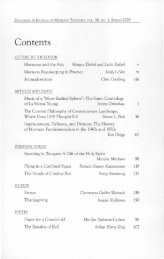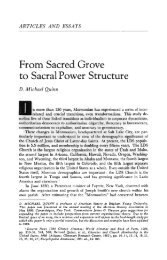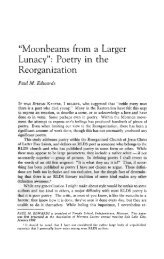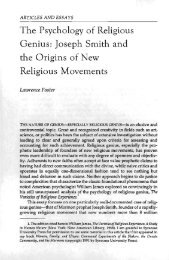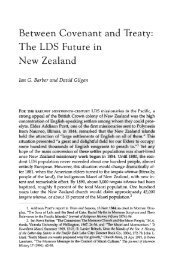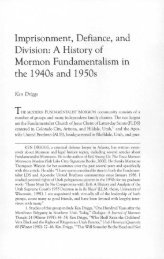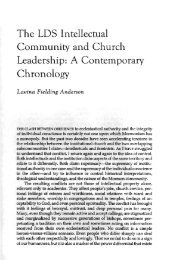Dialogue, Volume 25, Number 2 - Dialogue – A Journal of Mormon ...
Dialogue, Volume 25, Number 2 - Dialogue – A Journal of Mormon ...
Dialogue, Volume 25, Number 2 - Dialogue – A Journal of Mormon ...
You also want an ePaper? Increase the reach of your titles
YUMPU automatically turns print PDFs into web optimized ePapers that Google loves.
REVIEWS<br />
Reappraisal <strong>of</strong> a Classic<br />
Great Basin Kingdom Revisited: Contemporary<br />
Perspectives edited by Thomas G.<br />
Alexander (Logan: Utah State University<br />
Press, 1991), 164 pp., index, $17.95.<br />
Reviewed by Gary Topping, instructor<br />
<strong>of</strong> history, Salt Lake Community<br />
College.<br />
IN MAY 1988, the Charles Redd Center for<br />
Western Studies at Brigham Young University<br />
and the Mountain West Center for<br />
Western Studies at Utah State University<br />
jointly sponsored an interdisciplinary symposium<br />
to reappraise, on its thirtieth anniversary,<br />
Leonard J. Arrington's classic<br />
Great Basin Kingdom: An Economic History<br />
<strong>of</strong> the Latter-day Saints, 1830-1900 (Cambridge:<br />
Harvard University Press, 1958).<br />
Though neither editor nor publisher <strong>of</strong> this<br />
collection <strong>of</strong> essays presented on that occasion<br />
<strong>of</strong>fers any explanation for the frustrating<br />
three-year delay in its appearance,<br />
the collection is worth the wait.<br />
The carefully chosen participants are<br />
major scholars in literature, history, economics,<br />
sociology, anthropology, and<br />
geography. Since Arrington's book studies<br />
<strong>Mormon</strong> history and institutions, we<br />
should expect most <strong>of</strong> its appraisers to be<br />
<strong>Mormon</strong> as well. But not the least <strong>of</strong> this<br />
collection's assets is the presence <strong>of</strong> two<br />
card-carrying Gentiles — Donald Worster<br />
and Richard Etulain — whose fresh perspectives<br />
are sorely needed in the insular<br />
world <strong>of</strong> <strong>Mormon</strong> scholarship.<br />
Like most collaborative projects, the<br />
essays vary considerably. Many contain<br />
personal reminiscences <strong>of</strong> Arrington and<br />
his book; however, geographer Ben<br />
Bennion and sociologist Stan Albrecht bolster<br />
their appraisals <strong>of</strong> limited themes in<br />
the book with original research presented<br />
here for the first time in tables, maps, and<br />
narrative. Donald Worster's essay in intellectual<br />
history focuses on what he calls<br />
"the irrigation myth" (p. 30) —the notion<br />
that irrigation <strong>of</strong> arid lands creates not<br />
only a new agriculture, but a new people<br />
as well — a <strong>Mormon</strong> idea which he believes<br />
exists as an uncritically accepted assumption<br />
in Great Basin Kingdom.<br />
Bennion, Albrecht, and anthropologist<br />
Mark Leone all explore the influence <strong>of</strong><br />
Great Basin Kingdom on their disciplines<br />
and, even more important, reasons why<br />
the book has had a limited effect. Their<br />
conclusions, <strong>of</strong> course, vary, but Bennion's<br />
invitation for increased communication<br />
and even collaboration among disciplines<br />
is implicit in most <strong>of</strong> these essays. If<br />
accepted, that invitation could well be the<br />
most significant achievement <strong>of</strong> the conference.<br />
Are <strong>Mormon</strong> studies, as I alleged earlier,<br />
insular, incestuous, and intellectually<br />
sterile? Certainly the quality <strong>of</strong> the minds<br />
represented in this symposium indicate the<br />
possibility, at least, <strong>of</strong> creative, critical<br />
thought within the community <strong>of</strong> <strong>Mormon</strong><br />
scholars. But in the concluding essay,<br />
"Beyond the Problems <strong>of</strong> Exceptionalist<br />
History," Charles S. Peterson asserts that<br />
few <strong>Mormon</strong> studies since 1958 have followed<br />
Arrington's precedent in relating<br />
<strong>Mormon</strong> history and institutions to the<br />
wider world <strong>of</strong> American thought and<br />
experience. Instead, <strong>Mormon</strong> scholars<br />
have hidden behind an assumption <strong>of</strong><br />
<strong>Mormon</strong>ism's pr<strong>of</strong>ound exceptionalism,<br />
defeating comparative studies and absolving<br />
them <strong>of</strong> the obligation to relate<br />
their research to the larger world. Thus,<br />
meetings <strong>of</strong> the <strong>Mormon</strong> History Association<br />
attract only a few regular "token<br />
Gentiles," and <strong>Mormon</strong> articles and monographs<br />
feature tightly focused studies <strong>of</strong>


